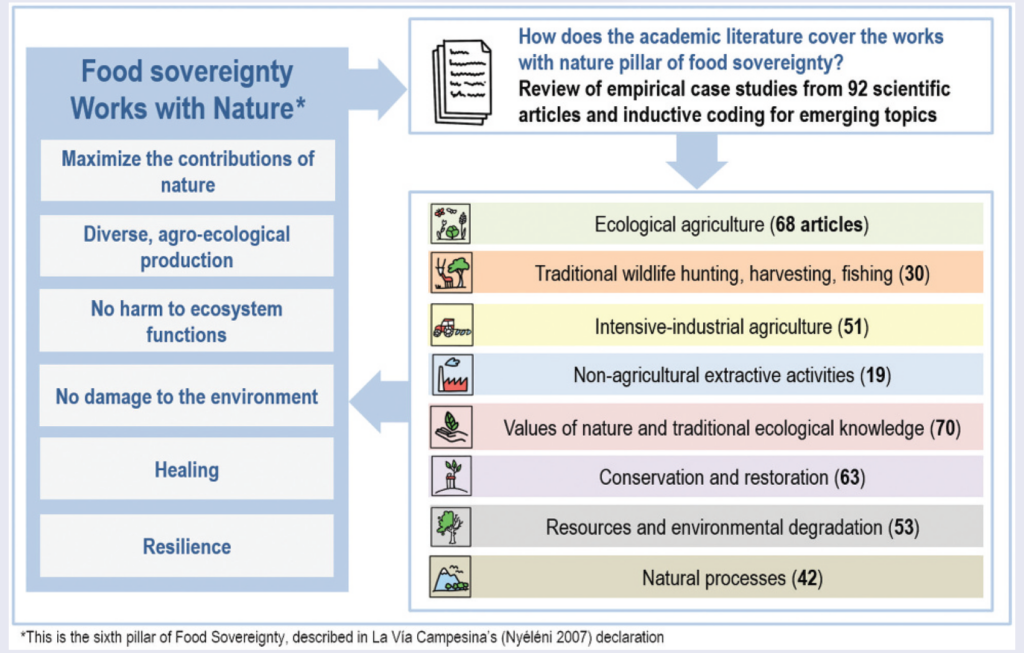
Food means survival and is therefore one of the most important relationships we have with nature. Yet food is not just the mere extraction of cultivated crops it is also a myriad of relationships which shape our values, lifestyles and cultures. At the same time, the way we produce and relate to food has effect on nature conservation.
The relationship between food and nature is a much-discussed topic in academia. Many lenses exist to study food-nature relationships, one of them being Food Sovereignty. This grassroots- and politically engaged paradigm, focuses not only on where food comes from but also how it is produced. In their recent article, Benavides-Frias et al. (2023) used this paradigm that was proposed by La Via Campesina, as ‘the right of peoples to healthy and culturally appropriate food produced through ecologically sound and sustainable methods, and their right to define their own food and agriculture systems’ (Nyéléni 2007). Food Sovereignty consists of six pillars, including the ‘works with nature’, which primarily emphasizes the relationship between humans and nature and the urgent need for sustainable use of land and resources to protect biodiversity and ecosystem functions. This pillar was the focus of a systematic literature review by Benavides et al. (2023) to analyse to which extent food-nature relationships were included in Food Sovereignty literature and which topics have been addressed.
They reviewed ninety-two articles six of which were written in Spanish and focused on place-based Food Sovereignty research. The result was a coding scheme with two overarching themes, practices and uses of natural resources and social-ecological conditions connected to the practices. Each theme was then divided into four sub-themes, as shown in the figure below.

The most common topics of the first theme were the rejection of intensive industrial agricultural practices, the importance of organic farming and rural depopulation, and the need to reverse the loss of traditional ecological knowledge (TEK). As food sovereignty is a political paradigm, the themes emphasized people’s struggle for their right to food and the protection of their livelihoods. The research also focuses on the underlying causes of problems with food and nature, such as economic and political structures that drive agriculture towards intensification. Based on these results Benavides-Frias et al. (2023) conclude that ‘this paradigm is thus interesting for researchers who feel the need to do engaged political research about food.’
The most important cross-cutting topics of Theme 2 (socio-ecological conditions) were the diverse relationships between humans and nature through TEK and the diversity of values associated with this. In the literature concerning values, ‘instrumental values, the value of nature for fulfilling human needs, were the most frequent. Food is in fact a means for human survival.’ (Benavides-Frias et al., 2023). Relational or intrinsic values were found less frequently, and when they were mentioned, they were mixed with instrumental values.
Less developed topics included non-agricultural extractive activities, traditional wildlife, hunting, harvesting, fishing and natural processes (e.g. pollination). Conservation could also be further developed, and linked to agroecological research, as the focus so far has mostly been on seeds and soil and could be extended to the conservation of the overall biodiversity of agroecosystems. The link between food sovereignty and agroecology has only recently developed, and the inclusion of agroecological frameworks could contribute to knowledge about ‘working with nature’. The paper by Benavides et al. (2023) suggests focusing on these topics in the future by emphasizing the social-ecological nature of agroecosystems.
Furthermore, the article finds out, that few articles engaged in transdisciplinary research, meaning that local actors were not included as part of the research teams that wrote the articles. Further research might be carried out in inter- and transdisciplinary teams involving local perspectives in order to find locally adapted solutions to complex problems such as those involving food and nature:
Understanding that food originates from the multiple interactions and characteristics of species will allow the further untangling of the complexity of the Food Sovereignty paradigm, which aims to fight not only for our right to food but for the reproduction of life.
Camila Benavides-Frias, Stefan Ortiz Przychodzka, Isabel Díaz-Reviriego, Elisa Oteros-Rozas, Leonie Burke, and Jan Hanspach (2023) Exploring the “works with nature” pillar of food sovereignty: a review of empirical cases in academic literature, AGROECOLOGY AND SUSTAINABLE FOOD SYSTEMS Doi: https://doi.org/10.1080/21683565.2023.2288318
Open access to the full paper to be found here:
https://www.bioculturaldiversity.de/wp-content/uploads/2023/11/Exploring-the-works-with-nature-pillar-of-food-sovereignty-a-review-of-empirical-cases-in-academic-literature.pdf
Further citations:
Nyéléni. 2007. DECLARATION OF NYÉLÉNI Sélingué, Mali: Forum for Food Sovereignty. Accessed December 11,2023: https://nyeleni.org/IMG/pdf/DeclNyeleni-en.pdf

